Early in the day in Fatih, Istanbul’s ‘Little Syria’, Eymen stands at his coffee stand in a crowded bazaar, where he spends most of his day making cardamom coffee.
“I’m gonna head to the pharmacy, let’s not take anyone inside the cafe, okay?” Eymen’s Turkish boss and the owner of the cafe tells Eymen before he leaves for Jummah prayers when most shop owners in Fatih close their shops for a couple of hours. Eymen nods with a shy smile. Like most Syrian refugees, he doesn’t complain about working long hours; he only repeats that he’s doing his best to live in peace in Turkey when asked about life as a Syrian in Fatih.
After the refugee crisis in 2015, Turkey absorbed around 3.5 million refugees into the country and granted them temporary protected status. Fatih, a conservative neighbourhood in Istanbul, quickly transformed into a hub for Syrians where refugees could find spices from Aleppo, coffee from Damascus and sweets that were hard to find elsewhere in the city.
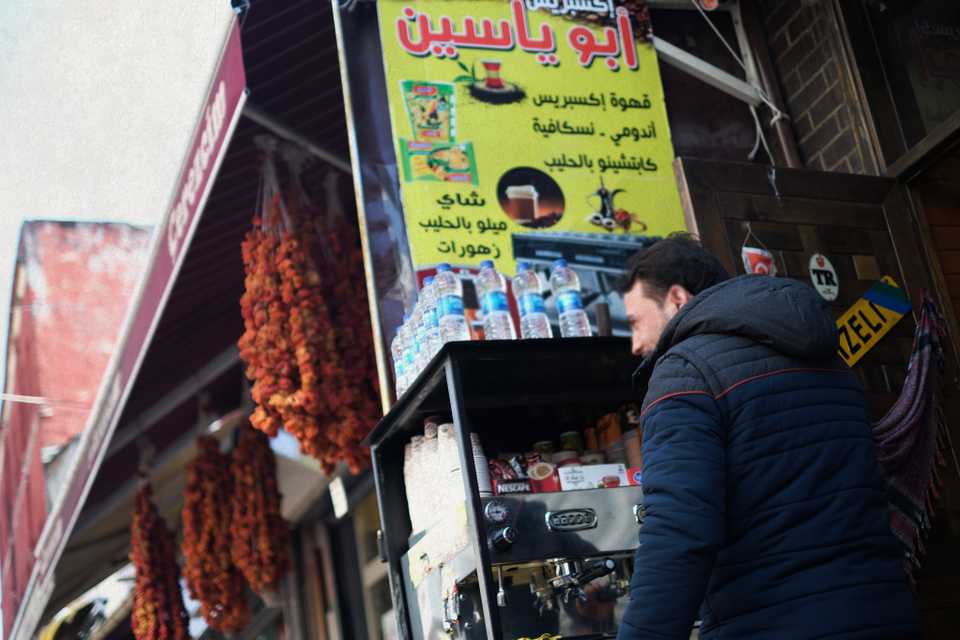
Now, with a few a days to go before local elections, the streets surrounding this Fatih bazaar are covered with election campaign posters. Most of the Syrians living in the area say they’re not closely following local elections. Out of 3.5 million, at least 30,000 Syrians have been granted Turkish citizenship. But a particular election slogan, which the nationalist IYI Party’s candidate Ilay Aksoy printed on posters around Fatih, got them hooked: “I won’t surrender Fatih to Syrians.”
In Turkey’s local elections, the race has become nearly as contentious as the general elections. The IYI Party and the opposition Republican People’s Party (CHP) have joined forces in 22 metropolitans and 27 provinces to grow their voter base – but Fatih isn’t one of them.
It was removed as a jointly contested area at the last minute after a dispute between CHP and the IYI Party, and now both parties have nominated their own candidates. Having to continue the race without CHP’s support, Aksoy then embarked on a tireless campaign not only featuring the controversial posters but also videos discussing Syrians in Fatih.
In one video Aksoy shared on social media, speaking from Malta Pazari—the most heavily Syrian-populated bazaar in Fatih—she points at the Arabic signs adorning stores and speaks of the need to remove Arabic signs and replace them with Turkish signs instead. Her anti-Syria campaign posters, which have been mocked on social media for having a Turkish language error, were later reportedly removed after a social media backlash that slammed them for being hateful and discriminatory.
But her videos, complaining that Syrians run almost the same number of shops as Turks and that Syrian refugees wouldn’t hire Turks and take jobs from them, remain on her social media accounts.
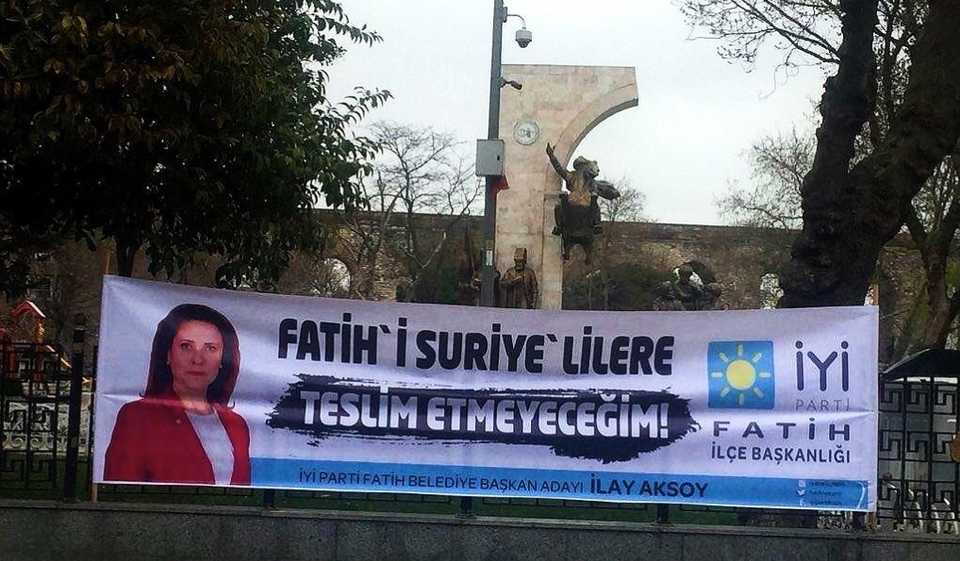
Eymen, 30, on the other hand, is not interested in what she says in the videos nor is he worried whether this kind of language targeting Syrians would trigger a broader backlash against people like him.
“I have been here for three years, my two girls go to school here and having [sic] no problems with my neighbours or friends,” he tells TRT World. “If they want me to go, I want to return to my country as soon as there is peace in my country anyway.”
He says he works all day long and takes care of his own business and doesn’t understand why that would bother anyone.
“I’m trying to make of my bread here — that’s all my concern,” he says in broken Turkish and continues in Arabic. Eymen’s Turkish friend who often comes by to see him, helped to translate Eymen’s response.
“People who hate are already hateful, and the others already know how we are,” he says.
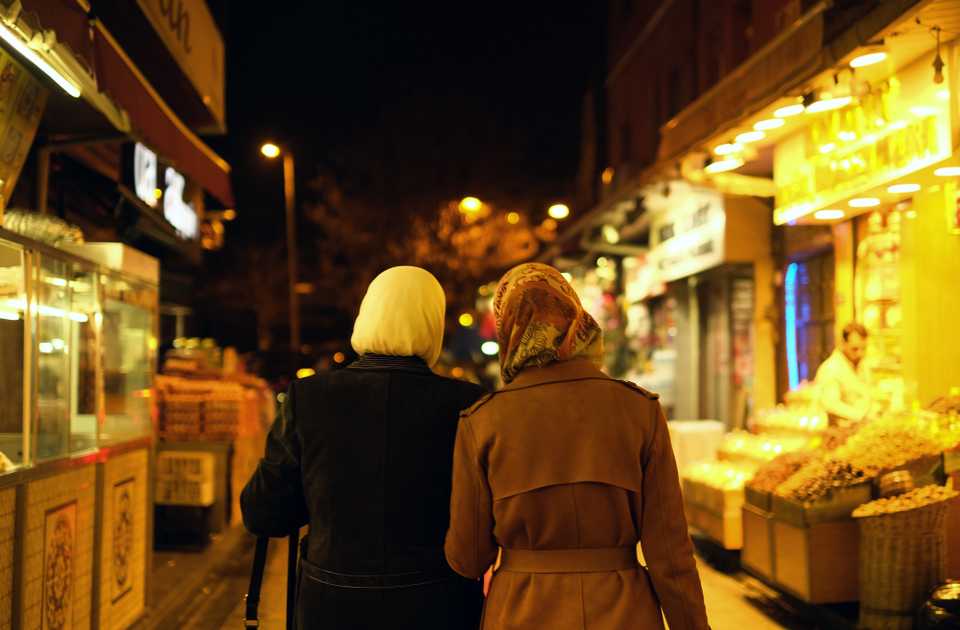
But not every Syrian can brush off the election rhetoric as easily as Eymen does.
“I find the accusations very unfair,” Beyhan, a 25-year-old woman tells TRT World, referring to an election campaign video that Akay filmed in Malta Pazari, two minutes’ walk away from Beyhan’s apartment in the basement of a nearby building. In the video, Akay said Syrians don’t open their shops until late.
“She’s not saying in the video that it was Sunday, of course, the shops were closed,” she says in near-fluent Turkish.
“When she was filming that video, I was passing by to go to my Turkish class in ISMEK, [Istanbul Municipality’s free lifelong education centre]. So it should be before 9 am in the morning.”
For Beyhan, Fatih has been a safe space since she came to Turkey three years ago with her mother intending to visit her brother until the violence calmed down.
She and her mother couldn’t go back, fearing getting stuck in the war, and her elderly father hasn’t been able to leave Damascus.
For Beyhan, her brother and mother it’s not an option to go back to their home yet. More than 104,000 people, including her brother that she hasn’t heard from in six years, have been imprisoned or disappeared since the beginning of the war in 2011.
Last year, Syrian regime leader Assad made a call for refugees to return Syria as the war slowly begins to wind down. That call won’t inspire many refugees with confidence as reports suggest that people were arrested or disappeared upon their return to Syria after the call.
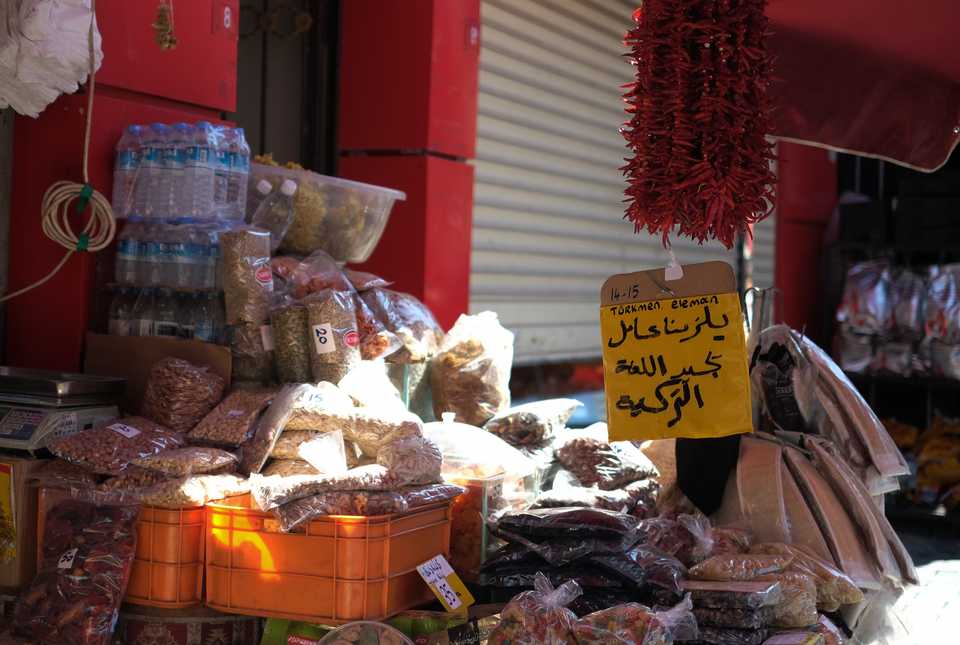
In a Fatih kahvehane, where many elderly retired men often spend time drinking tea and playing board games, there is a disagreement on the status of Syrians. Sitting in little chairs in front of the shop next to each other they’re all cheerful as they gather around a tiny bird that an old man brings along – until a debate unfolds.
An elderly retired Turkish man, Devrim, subscribes to the IYI Party’s rhetoric and says he doesn’t care if Syria is at war and that everyone is responsible for their own countries – and as a Turk he needs to put his own interests first. He says if necessary, they should die defending their country.
His friend Bulent also occasionally supports his friend’s argument while sipping tea. As bystanders wait their turn to present their views, they both argue that Syrians can’t get along with each other and up fighting and disrupting order
As the man who brought the bird gets uncomfortable with the conversation and leaves, another retired man, Osman, who listened silently until now, interrupts impatiently.
“Don’t Turkish youngsters fight each other, too?”, he asks. He explains that these were small fights and they are just some individuals, not all Syrians.
“If they’re in need of refuge, in need, it’s our duty to help them,” he concludes.
The second man, Bulent, who agreed with Devrim’s view that Syrians should leave Turkey, now finds himself agreeing with the man defending refugees. “You’re right, too,” he says.
“I’m 59…have lived in Fatih for 40 years — I know Syrians better than anyone else. Never seen a theft or vice from them, I intentionally rented my house for cheaper prices to Syrians who are in need,” Osman continues defending Syrian refugees.
“As if public order was flawless before Syrians…” he adds.
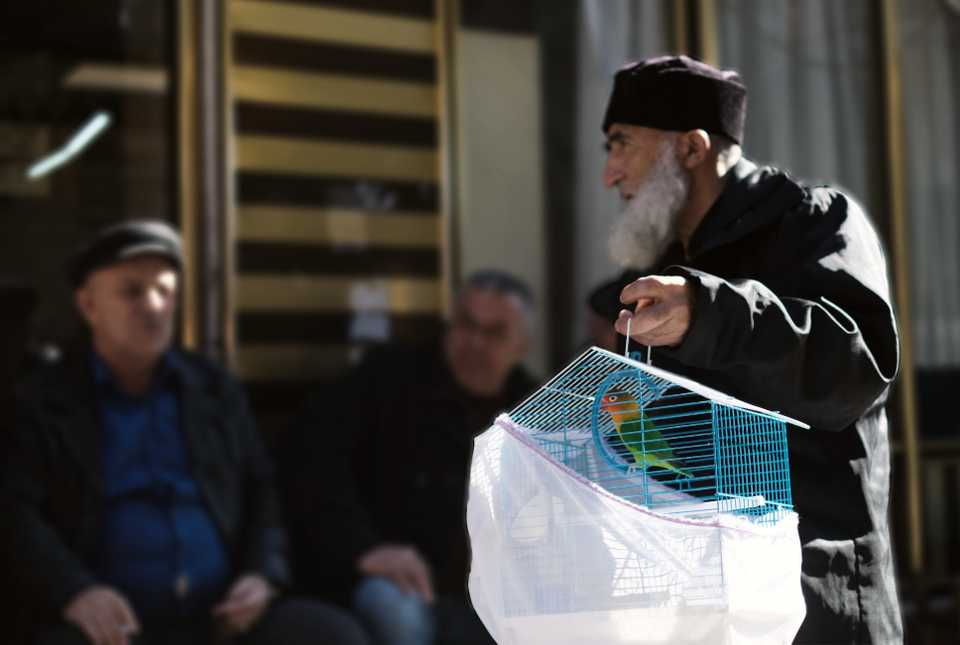
Disrupting ‘public order’ is likely one of the most oft-repeated arguments among those who are uncomfortable with the presence of Syrians in Fatih. Especially during election time, Syrians often find themselves subjected to widespread false accusations and generalisations that circulate on social media.
Some of these claims reemerge during election time: Syrians are given salaries by the Turkish government (930 Turkish lira per month); they can study at any university without restrictions, or falsely accusing them of crimes.
Addressing this issue, a tweet on the account of the governing Justice and Development Party’s (AK Party) Istanbul mayoral candidate and former prime minister Binali Yildirim’s, reads: “If Syrians disrupt the tranquillity of Istanbul, create a security problem and affect normal life, we can’t ignore this. We can’t tolerate these and send them back.”
The message came as a surprise as the AK Party has welcomed Syrian refugees for years now. Yildirim’s communication officer later clarified the statement to TRT World, saying that it was intended to be directed to the individuals who commit crimes, not all Syrians.
“In our culture, we have the [tradition of] opening our homes, our country to those fleeing death regardless of their religion. We accepted Syrians, they would have been killed otherwise. Their temporary protection status mean they would return to Syria,” he said in his communication office’s follow up tweets quoting him.
According to the Turkish government, 350,000 Syrians have returned to Syria’s Turkey-backed opposition Free Syrian Army (FSA)-controlled areas in Northern Syria which now has no Syrian regime influence.
In two military operations, Turkey has fought against Daesh and the YPG, the Syrian branch of PKK, which the US and Turkey list as a terror organisation. Turkey plans to resettle more Syrian refugees to these areas.
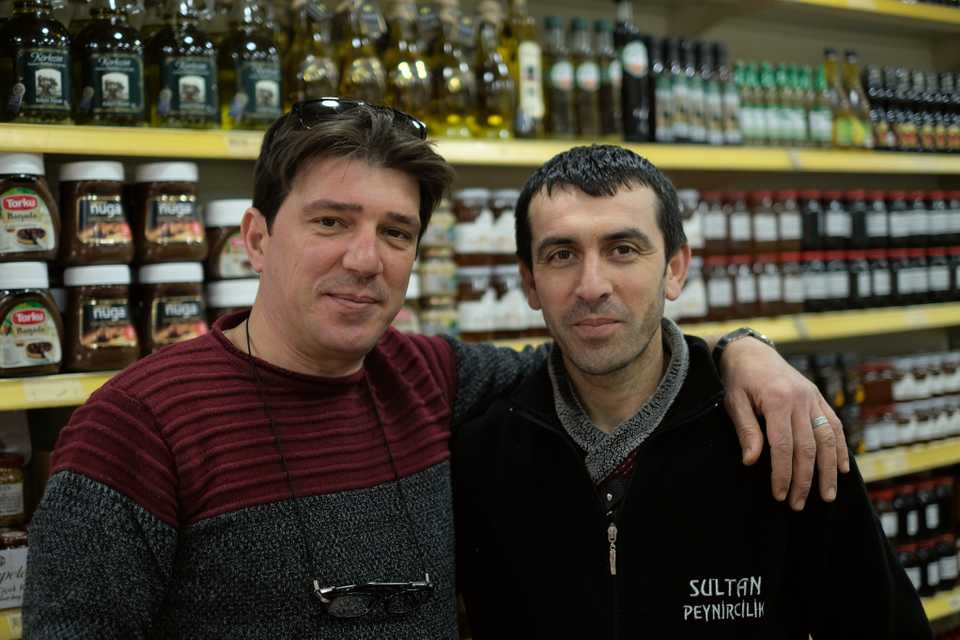
Idris, a 35-year-old man, has been working with his Syrian colleague Ridwan, from Damascus, for two years selling Syrian products. He doesn’t mind one bit if Syrians stay in Fatih, and is happy that they’re helping each other out.
“Ridwan learned a little bit Turkish, and I have learned a little bit Arabic — he’s like my brother now and we’re just doing fine,” he says.
“Before the election, everyone is doing whatever they can. Those lies are only an effort to gain more votes in Fatih.
“It doesn’t reflect the reality — everyone knows that we live here like relatives.”

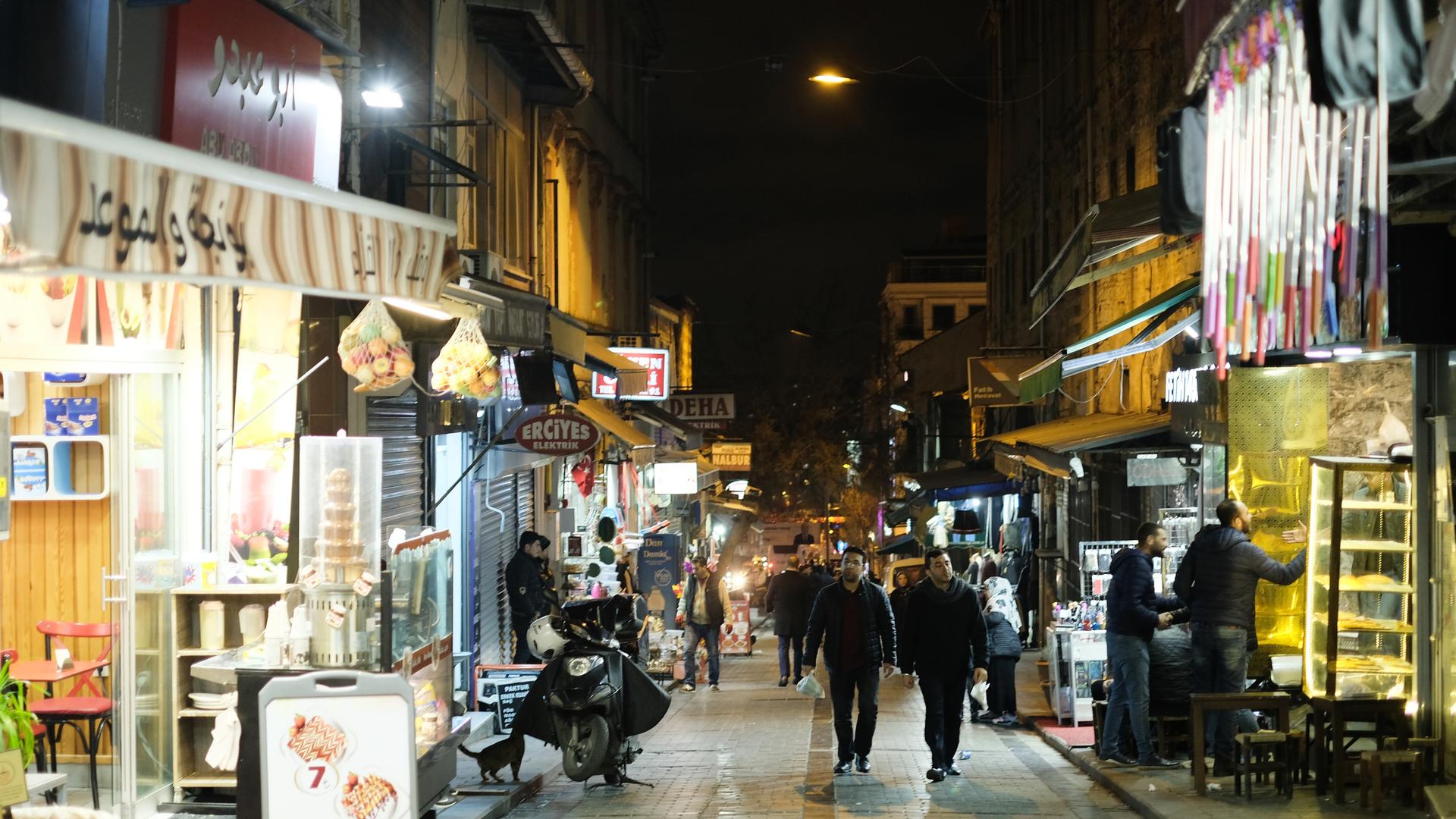








Discussion about this post